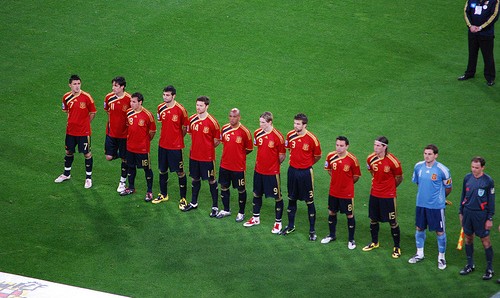Spain cannot be written off just yet
With Gerard Pique, Carlos Puyol, Jordi Alba, Sergio Busquets, Cesc Fabregas, Xavi, Andres Iniesta, Pedro and David Villa the common denominators, it’s fair to say that FC Barcelona is roughly equivalent to the Spain national team, particularly given their all-conquering dominance of world football over the past five years.
But in the last three months, both sides have been humiliated in a manner that has led many to suggest their era of dominance is over.
Barcelona were brutally massacred 7-0 over two legs by a truly magnificent Bayern Munich side in the Champions League semi-final in April, before virtually the same group of players were torn apart by an inspired Brazil in last weekend’s Confederations Cup Final in Rio de Janeiro.
The final in the Maracana ended 3-0, with two goals from Fred and a rasping strike from Neymar, but could easily have been a far more embarrassing scoreline for the world champions.
There can be little argument that Bayern’s brilliance has now eclipsed that of Barcelona on a club level, but on the international stage, far too many are getting carried away with the latest turn of events.
Lest we forget, this was the Confederations Cup. It is international football’s equivalent of the Community Shield, or the World Club Cup – a nice bonus for the winners, but no heads will roll if it goes too badly. Nobody usually cares about the winners’ extra little competitions.
Interest seemed to be unusually high in this summer’s tournament – partly out of love of an underdog story (and Tahiti did not disappoint in providing entertainment) and partly out of genuine curiosity at how this Brazil side is developing ahead of their own World Cup next summer.
Brazil passed the test with flying colours, but the significance of the win is negligible in the grand scheme of things.
The Confederations Cup is valued considerably more highly in Brazil than anywhere else in the world, hence their tendency to win just about every edition of it, including the last three.
Its importance was clear for all to see in the passion and fervour with which the national anthem was belted out around the Maracana, replicated on the pitch by the high-intensity tactics favoured by manager Luiz Felipe Scolari.
Let’s rewind four years to the last tournament, in South Africa. Brazil’s 3-2 victory over the United States in the 2007 final instilled confidence that the Selecao were ready to take home the World Cup the following year.
Then when it actually mattered, the players choked and a series of turgid performances saw them dumped out at the quarter-final stage by an unspectacular Netherlands side.
Spain also featured in that competition, and were shocked in the semi-finals by Bruce Arena’s Americans. A year later, they swept aside all before them to cruise to their first ever World Cup win.
As impressive as Brazil were this summer, it was clear for all to see just how much more it meant to them than everybody else. That won’t be the case again when it comes to the World Cup.
There can be little argument that Bayern’s brilliance has now eclipsed that of Barcelona on a club level, but on the international stage, far too many are getting carried away with the latest turn of events
.
Their current squad is strong, but by no means a great one. Their strikers, Hulk and Fred, have only experienced very modest careers in Europe, while the likes of Neymar and Paulinho still have plenty to prove on the word’s biggest stage. Hype is a dangerous thing.
Spain, meanwhile, will have the inspirational Xabi Alonso back in the side, completing their formidable midfield trio and giving Xavi and Iniesta, the architects of both their sides’ dominance, free rein once again.
Xavi in particular looked hopelessly exposed under the unrelenting pressure placed on him by Brazil’s energetic midfield, having been compelled to play in a deeper role in Alonso’s absence.
The Spaniards were also, quite simply, caught on an off-day, exemplified by Xavi’s struggles and by the torrid time Alvaro Arbeloa had at right-back.
But when it matters, they possess the experience, the confidence and, most importantly, the immense ability to turn things back in their favour, as they have shown numerous times over the past few years.
Brazil now go into next year’s tournament bearing not just the hope and expectations of an entire nation, but propelled by a bandwagon as well. Spain have shed their chokers tag and are far and away still the strongest, most cohesive unit in international football. Reports of their demise have been greatly exaggerated.

Comments